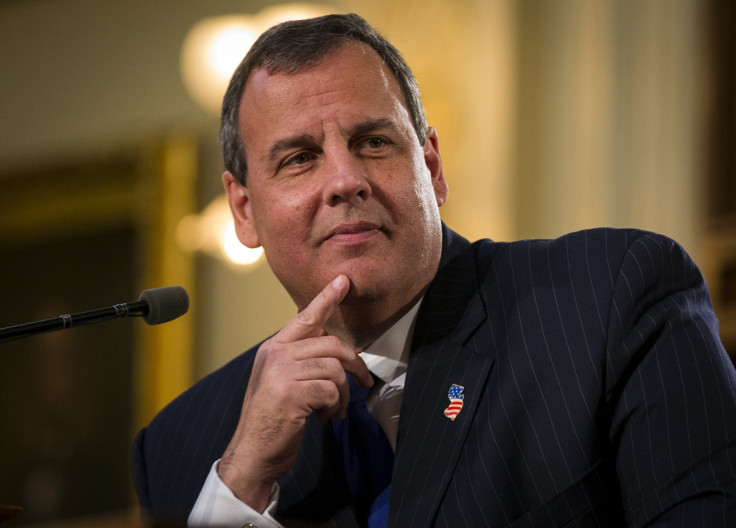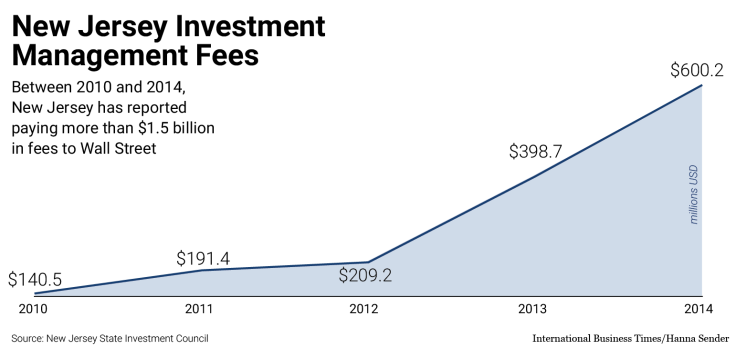Chris Christie Administration Paid $600M In Financial Fees In 2014

Under Chris Christie, the New Jersey pension system paid more than $600 million in fees to financial firms in 2014 -- 50 percent more than a year ago, and a higher rate than almost any other state reports paying for pension management. The figures are buried within an otherwise routine annual report that appeared to change the way the fees were counted to make them look smaller than they actually are.
That accounting change comes at a time when the Christie administration is under scrutiny for investing pension money in high-fee firms whose executives made campaign contributions to Republican political groups. The move obscuring the increase in reported fees also comes on the heels of Christie telling New Jersey teachers, firefighters, cops and other public workers that “there are no alternatives” to cutting their retirement benefits because the state pension system is so strapped for cash.
“The lack of transparency, skyrocketing risks and fees and chronic underperformance makes New Jersey the poster child for the kind of shenanigans happening in pension systems across the country,” said former Securities and Exchange Commission attorney Ted Siedle, who conducts forensic investigations of state and local pension systems.
The New Jersey Department of Treasury and Christie’s office did not respond to International Business Times' request for comment.

The report from the Christie-appointed State Investment Council was released in late January. It shows that taxpayers spent $600.2 million -- or $1.6 million a day -- on fees to private financial firms in 2014. The year before Christie took office, New Jersey’s State Investment Council reported that the pension system paid $125 million in financial management fees. By 2013, the state reported paying $398 million in such fees.
In all, since Christie took office, his administration has spent $1.5 billion of retirees’ pension money on Wall Street fees. That’s more than the cut Christie made to the state’s required pension payment in 2014, and it is more than the state has budgeted for its entire Department of Environmental Protection over the last 5 years. Had the Christie administration maintained the fee level the state was paying in the year before the governor took office, the pension system would have saved more than $914 million.
The higher fees are a result of the Christie administration shifting billions of dollars of pension money into high-fee hedge funds, private equity, venture capital firms and other so-called alternative investments in politically connected Wall Street firms. State records show the share of alternative investments in the pension portfolio has increased by nearly a third.
The high fees that come with such investments are supposed to buy higher returns than can be made from low-fee stock and bond index funds. Yet, under Christie, the New Jersey pension system has delivered returns that have trailed the median for similarly sized pension funds. The state’s high-fee alternative investment portfolio has also lagged behind the S&P 500.
With a recent pay-to-play investigation of a New Jersey pension contract attracting intense scrutiny of the state’s financial fees, the New Jersey Investment Council’s new annual report in January purports to show a decrease in fees paid to Wall Street. But a close reading of the document shows that state officials in 2014 changed the report’s tables to not count $334 million of payments to financial firms as fees. Instead, the payments were -- without any explicit explanation -- reclassified as performance “allocations.”
That let Christie officials claim that the system spent just $265.4 million on fees -- seemingly less than what it spent in 2013 when that year’s report said the state “paid $378.1 million in management and performance fees” on top of another $20.6 million in adviser fees. The move also let Christie officials claim that in 2014, the state spent only 32 cents on overhead costs per $100 of pension money it manages.
When the $334 million of performance fees is counted, however, the aggregate fee total reveals a huge spike in reported payments to financial firms. It shows that under Christie, New Jersey taxpayers are now spending 67 cents on fees per $100 under management. That is more than triple the fee rate since Christie took office in 2010, and more than 50 percent higher than the median for state pension systems, according to a 2013 report by the Maryland Public Policy Institute.
“The real overhead cost number puts New Jersey’s pension fund’s expense ratio among the highest in the nation, despite the fact that its investment performance is below its peer group,” said investment banker Jeffrey Hooke, who conducted the national study of pension fees. He speculated that Christie officials, uneasy about the New Jersey pension system’s high fees and mediocre results, “papered over the problems by separating big performance fees. The fund unfortunately misleads taxpayers and union members about what is really going on.”
New Jersey statutes say that it is illegal “to make any untrue statement of a material fact or to omit” key details in financial statements about securities.
Jim Marketti, who served on the State Investment Council from 2008 to 2012, said he believes the shifting of accounting to obscure the Wall Street fees is part of a pattern.
“The most troubling and disgusting aspect of my service on the State Investment Council was the practice of the leadership of the council and the Division of Investment of changing the basis on which they reported goals, data, performance and costs usually from year to year but often from month to month in order to burnish the outcomes they claimed to produce,” Marketti told IBTimes.
Tom Bruno, chairman of New Jersey’s Public Employees Retirement System, told IBTimes that his board of trustees has been kept in the dark about the fee increases.
"A 50 percent fee increase is a huge increase, but the trustees haven’t heard anything about this,” he said. “For the investment council to use language that isn’t even standard market terminology is particularly concerning. Pension fund trustees in New Jersey will apply a high standard of scrutiny to the latest investment council annual report."
Last week, Christie’s pension commission released a report calling for cuts to guaranteed retirement income and health benefits for public workers. The report did not include trying to reduce financial fees among its suggested pension reforms. The Christie-appointed commission’s chairman is a former partner at Goldman Sachs, whose subsidiary has been paid more than $7.5 million in fees from the New Jersey pension system since 2008. Most members of the commission’s board are current or former executives at investment and financial consulting firms, and the commission’s executive director is a former executive at the private equity giant KKR.
In recent days, Democratic and Republican lawmakers in New Jersey overwhelmingly passed legislation that would force the State Investment Council to provide greater disclosure of fees paid to financial firms. The bill is now awaiting Christie’s signature or veto.
© Copyright IBTimes 2024. All rights reserved.






















